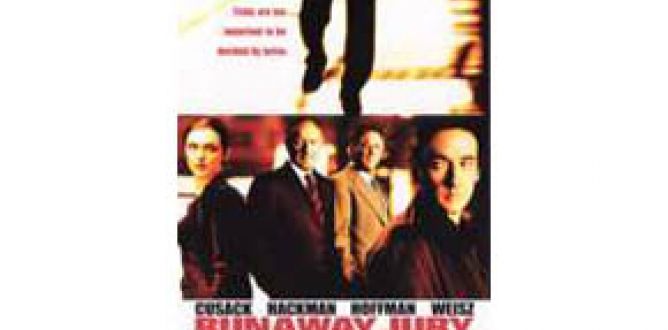Runaway Jury Parent Guide
Parent Movie Review
Laaaadies and Gentlemen… welcome to the main event in the John Grisham ring of boxing lawyers. Our first contestant, in the far corner weighing in with a ton of covert electronic eavesdropping technology aimed at identifying the perfect jury, and representing the evil gun manufacturers of America, is the mother-of-all defense attorneys Rankin Fitch (Gene Hackman). In the other corner, sporting only a wrinkled suit, worn Florsheims, a clean conscience, and the sporting desire to fight right, is Wendell Rohr (Dustin Hoffman), representative of the “little people.”
And so the stage is set for Runaway Jury, a movie that takes Grisham’s novel about the responsibilities of tobacco producers and substitutes issues of gun control and the Second Amendment. The result is the typical courtroom dramatics that we have come to expect from the novelist, and anyone who appreciates his style should go home happy.
The movie opens with a rampant shootout by a recently dismissed employee whose bitter reaction turns violent and suicidal. Frustrated by the crime, the widow of one of the victims takes legal action against the maker of the firearm used to kill her husband on allegations that the company is accountable for the use of their product.
Her representative, Wendell Rohr, is convinced solid testimony from a key witness, along with good ol’ fashioned courtroom posturing, will hang the gun guys out to dry and create an historical precedent. But he’s heavily underestimating the lengths his opponent Fitch is willing to go to win this case.
A settlement in favor of the grieving widow would have a devastating effect on the American firearm industry, which is why a coalition of gun manufacturers hires Fitch and his illicit skills at handpicking jurors. Armed with hidden cameras and microphones, Fitch scouts out each of the potential jury members and analyzes their personality makeup. Promising a judgment in the client’s favor, the crafty counselor is in line for a handsome remuneration.
But neither considered the interjection of a juror (John Cusack) with his own agenda, creating a scenario where three people think they are in control, when in reality no one is.
Aside from the complex adult oriented theme, moderate amounts of language (including a single use of the sexual expletive), a brief moment of unmarried passion, and the tense opening scene (which is artfully executed without any onscreen shootings or blood) will be cause enough for most parents to leave pre-teens at home.
Yet Jury does offer older teens and mature audiences opportunities to address many questions about our legal system and the possibility of one person being able to sway the entire judgment system purely by their talent of manipulation.
And it is that very possibility that will leave audiences asking “What if?” and gives this movie the potential to become a runaway success.
Starring Gene Hackman, Dustin Hoffman, John Cusack. Theatrical release October 17, 2003. Updated July 17, 2017Runaway Jury Parents' Guide
Is it possible for a jury to be manipulated in the manner shown in this movie? Can you think of a better or more effective method for judging people within our legal system?
A man who owns a gun shop testifies in court. He has a beard and longer dark greasy hair. He’s also portrayed as a little “simple.” What impression does this stereotype leave the audience with?
One man tells another angry man, “You cannot carry that much contempt or it will become malignant.” How can anger take over our entire personality? What are ways we can rid ourselves of hate toward others?
Home Video
Related home video titles:
The Rainmaker is another John Grisham novel adapted to the screen. The influence one member of the jury can have on the verdict is the central theme of the various remakes of the film 12 Angry Men.

